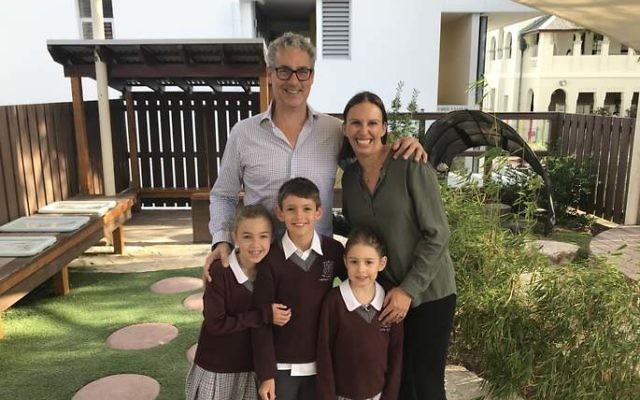Fighting back on BRCA
“OTHER than fear, I felt empowered," said 39-year-old Sydney-based resident Amanda Isenberg as she described her reaction upon receiving the troubling, life-changing news that she is a carrier of a fault in the BRCA1 gene at age 29.

“OTHER than fear, I felt empowered,” said 39-year-old Sydney-based resident Amanda Isenberg as she described her reaction upon receiving the troubling, life-changing news that she is a carrier of a fault in the BRCA1 gene at age 29.
“Breast cancer wasn’t very strong in my family. My maternal grandmother had breast cancer, but she was still alive at the time,” remarked Isenberg.
“After the birth of my son, I asked my mother to get tested … She was positive for the BRCA1 mutation, and I knew I also would be positive.”
Around one in 400-500 people in the general population will have one of three specific faults in the BRCA1 or BRCA2 genes, which is linked to an increased risk of ovarian, breast and prostate cancer, but for those with Jewish heritage, one in 40 people will have one of these three faults.
In light of the significantly higher rates affecting Jews, predominantly those of Ashkenazi descent, free genetic testing via a research pilot program called JeneScreen, supported by Sydney’s Prince of Wales Hospital and Wolper Hospital, the Murdoch Children’s Research Institute in Melbourne and Ovarian Cancer Australia has been developed through funds from the Wolper Hospital Foundation.
The program is now enabled by funds secured from winning last year’s JCA Jumpstart Sharktank, and the generosity of donors.
Head of the Hereditary Cancer Clinic at the Prince of Wales Hospital, Dr Lesley Andrews commented, “For the last 20 years, genetic testing for these three gene faults has been available to individuals who either have had a relevant cancer – usually breast or ovarian, but sometimes men with prostate or pancreatic cancer too – or where people have a family history of breast or ovarian cancer.”
Individuals aged 18+ who are living in Sydney or Melbourne, have at least one Jewish grandparent, have not previously undergone BRCA testing, are not aware of any family members being identified as a carrier of a BRCA fault, and have not been diagnosed with cancer within the last 12 months are eligible to participate.
Geneticist Professor Martin Delatycki at the Murdoch Children’s Research Institute remarked, “About half of the people who have mutations don’t have a family history to suggest it, so screening is the only way for them to learn of [the mutation].”
Over the next 18 months, approximately 1000 people in Sydney and the same number in Melbourne will be tested.
In Sydney, information will be disseminated online, whereas in Melbourne, information is to be delivered through face-to-face sessions, allowing people to decide whether they want to proceed with genetic testing, which will be conducted through a cheek swab.
“If someone has the mutation the process from there will be very similar in Sydney and Melbourne,” said Delatycki. “They will meet a geneticist or genetic counsellor to discuss their options and be referred for relevant screening and consultations.”
For women with a BRCA1 or BRCA2 fault, they are advised to have breast MRIs from age 30.
“They may be suitable for other risk reduction strategies with medication, and women are given the option of a preventative or risk-reducing mastectomy with reconstruction,” explained Dr Andrews. “Women around age 40, depending on their gene fault, are also recommended to undergo preventative removal of their ovaries and fallopian tubes.”
| Chance of developing breast/ovarian/prostate cancer if a person has a mutated BRCA1 or BRCA2 gene (%) | |||||
| No fault | BRCA1 fault | BRCA2 fault | |||
| Women | Breast cancer | 13 | 72 | 69 | |
| Ovarian cancer | 1 | 40 | 18 | ||
| Men | Breast cancer | <1 | 1 | 6 | |
| Prostate cancer | 5 | 9 | 15 | ||
Statistics: JeneScreen.
In Isenberg’s case, she began having regular mammograms, ultrasounds and MRIs, and with the assistance of preimplantation genetic diagnosis, she has two daughters that are BRCA free.
“Finding out that you are BRCA positive is not a life sentence,” said Isenberg, who has also had prophylactic bilateral mastectomy, and intends to have her ovaries removed or a full hysterectomy down the track. “It is empowering and informative and could save your life.”
Men who carry a BRCA gene fault are advised to have annual prostate-specific antigen measurements from their early 40s.
“No specific breast screening is recommended, but if they notice any change in their breast area, it should be investigated,” said Dr Andrews.
When a male carries the fault, the mutation may be unsuspected because the man has never developed breast or ovarian cancer, prompting Dr Andrews to emphasise the importance of men getting tested too, while adding that this pilot does not test for all BRCA1 and 2 gene faults.
Professor Delatycki commented, “This screening is very important to inform programs that we hope will be government funded in the long-term.”
Infoline
For more info: www.jenescreen.com.au. In launching JeneScreen, Dr Lesley Andrews will speak at the National Council of Jewish Women of Australia (NSW) on October 3, 10.30am-12pm. RSVP: (02) 9363 0257 or admin@ncjwnsw.org
SOPHIE DEUTSCH

comments